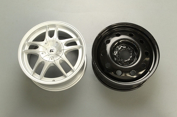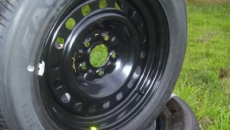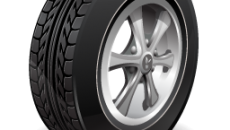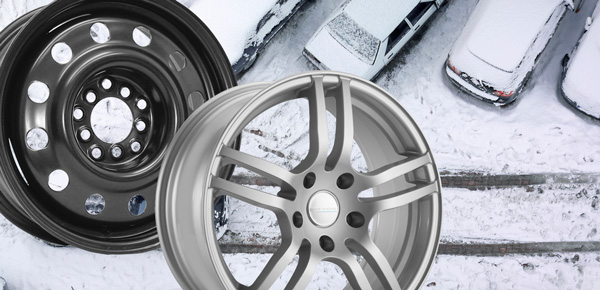Should You Swap Steel Wheels With Alloy Rims Just After Buying Your New Car?
There was a time when almost every car used to come with steel wheels, and first thing that people used to do was to get shiny new alloys rims, mostly bigger, and new rubber to wrap those alloys.
Even now, base model Corollas and Citys’ come with steel wheels. Well we do like to get them alloy wheels but there are few things we need to keep in mind. Do note that both have their advantages and disadvantages. In simple, if you want to show off with a side of performance, get alloys. But if you drive a workhorse that takes a lot of beating on daily basis, steel wheels are your best bet.
Steel Wheels
 The weight of wheels, tires, brakes and disks is called ‘unsprung weight’ because it is not being cushioned by the suspension of the vehicle. These things are hanging below your shocks and springs.
The weight of wheels, tires, brakes and disks is called ‘unsprung weight’ because it is not being cushioned by the suspension of the vehicle. These things are hanging below your shocks and springs.
Unsprung weight has much more effect on how the car handles than an equivalent amount of weight above the springs, such that even a small change in weight can have large effects.
Steel wheels are heavier than aluminum, so when you put steel wheels on a car that has had alloy wheels, you tend to find that the extra weight dampens acceleration and agility, lowers the car’s center of gravity and in general makes it drive more like a truck. Steel wheels do have a positive effect if you’re driving in winters and in snowy conditions. Extra weight is going to help tires dig in the snow/slush harder making you feel planted.
Steel wheels are also far stronger than alloy wheels. It is almost impossible to crack them. The force it takes to bend steel wheels is enough to crack, or even break the alloys.
Alloy Wheels
 In Pakistan, we get alloys in almost all top of the trim models of cars offered by local manufacturers. Alloy wheels are lighter than steel wheels and you can cast the alloy to get different designs, for both performance and aesthetics. Alloy wheels present far more options for the car owners to customize their vehicles to their liking.
In Pakistan, we get alloys in almost all top of the trim models of cars offered by local manufacturers. Alloy wheels are lighter than steel wheels and you can cast the alloy to get different designs, for both performance and aesthetics. Alloy wheels present far more options for the car owners to customize their vehicles to their liking.
The aluminum/nickel alloy is much lighter than steel and makes for more agile performance and better acceleration. The magnesium alloys are even lighter and are also stronger.
The disadvantage of alloy is that they are week. They don’t take the beating as good as steel wheels do. You can crack your fancy alloys far easier than steel wheels. To degree to which an alloy wheel is pliable or brittle depends greatly on how much nickel is added to the aluminum to make the alloy – more nickel adds weight and tends to make the alloy more brittle, less means a lighter wheel that is softer and tends to bend more easily. The construction method of alloys also has deep impact on its crash strength.
So the question is, what kind of vehicle you have and what are your daily driving needs. Choosing right wheel combined with the right tire for your car is very important for you and your passengers’’ safety.



by the way, branded and factory genuine alloy wheels have more strength than steel wheels, only they are difficult and expensive to repair if cracked. a way to check alloy wheel’s authenticity is by comparing its weight to same sized steel wheel. it should be lighter or it isn’t authentic. the Taiwanese wheels(alloy but authentic high quality) i bought in 2003 are still working flawlessly without any bend or leak vs steel rims which lasted only five years(1998-2003) with problems.
I had OEM steel wheels on my Liana. the holes that hold the nuts started to become lose with in a period of 3 years(55000km) but the alloys on my corolla have worked perfectly for 7 years or 82000 km, see it the way you like.
I strongly disagree “The force it takes to bend steel wheels is enough to crack, or even break the alloys”. I had to replace steel wheels after all four of them got bends and tires started losing air pressure. Replaced with alloy and no problem since then.
The other day, I was at a tyre shop, and I saw a brand new GLi uncle swapping out his steelies for some alloy rims but didn’t go out to change the tyre and he fitted the same General Euros on the that slightly bigger Alloy rims, result? The tire ended up being shaped like a ball. The sidewall were pumped up. Pretty sure he’ll then spend the time cursing the tyre rather his silly mistake of making his alloy rims into a ball.
Alloy wheels and if you have low profile tires as many enthusiasts put on their cars.. you are calling for an all time anxiety.. curb rash and pot holes are nightmares.. 😉 refinishing alloy wheels are not very reliable as far as color , texture and finish is concerned and it also cost money..
Both have advantages and disadvantages…..the most important thing is try to stick to/near to OEM size and do double check PCD and central hub diameter to match original steel wheels……otherwise one will end up in loosening of lug-nuts which is very dangerous especially in cars which support their wheels on central hubs like charade,daewoo racer etc…..one can alter central hub diameter of alloy wheels by machining them except in case of magnesium alloys.and moreover magnesium alloys can fire up sometimes in immense heat….so use ventilated or cross drilled disks for very harsh driving otherwise they are safe.
HI all, i just wanted to know if alloy rims have any adverse effect on the car suspension. I mean i dont carry more weight on my car and mostly drive alone so breaking or cracking is not issue for me.
You have got pretty bad grammar. Why would we trust you?
hahahahahahahha